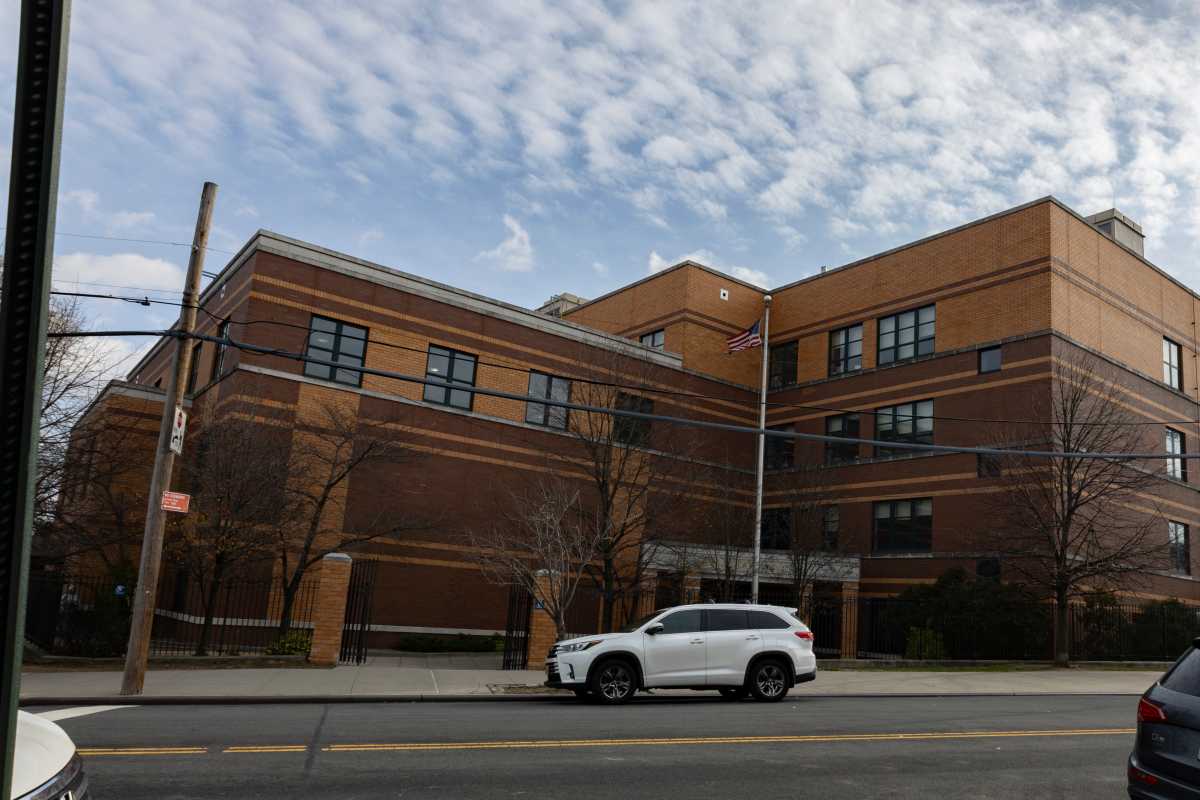By Jessica Mintz
Italo is a poet.
Adrian wants to be a teacher.
Fred might be the next Slim Shady — a Korean Eminem.
All three are high school students at Murry Bergtraum, a public high school with a student body of about 3,000, located on Pearl St. in Lower Manhattan that specializes in preparing students for business careers.
But it doesn’t sound like these three are inclined to pursue such a career. Instead, Bergtraum was a place where they knew they would find community, a place where their sisters and brothers (in the biological sense, and the closest-of-close friends sense) had already navigated the halls. That bit of comfort was especially important for Italo, Adrian and Fred, because in addition to all the new challenges that high school brought, they were also coping with another level of adversity. All three have cerebral palsy (a disability resulting from damage to the brain before, during or shortly after birth and manifested by lack of muscular coordination and/or speech disturbances) and all three spend the school day in wheelchairs.
At Murry Bergtraum, Italo, Adrian and Fred are three of 18 students in wheelchairs. Tessa Austin, the school’s assistant principal of special education, oversees a program with 20 teachers and 152 students, some on crutches, one with a walker, others who are hearing or speech impaired or have learning disabilities or emotional disabilities.
The classes in her department, says Austin, are “parallel to mainstream classes. It’s the same course outline, but it may take a little longer,” and classes, at 15 students per teacher, are about half as big as a mainstream Bergtraum class.
Clustered in Austin’s office, Italo Martinez, Adrian Watson and Fred Joh crack jokes non-stop, filled with high school slang and pop culture references. They’re happy to be missing two whole periods of class to talk to a reporter (at one point, raising their hands to the heavens to thank God), but from what Adrian says, it sounds like within the small community of physically challenged students at Bergtraum, this constant, easy banter is the norm.
Adrian, a senior from Spanish Harlem, came to Bergtraum following in her older sister’s path, even though she was hoping to go to a school that meshed better with her career aspirations.
“I took finance, but I didn’t want to take it as a major,” she says. “I want to teach. Hopefully, I will be able to get into Hunter. I took my S.A.T.’s and I’m a little anxious about getting those scores.”
Fred is also a senior and lives in Clinton. He’s only been at Bergtraum since last year, says Austin, but it’s already better than his last school, where he was getting into trouble. “I wasn’t mature,” he says, and then, with some effort, squeezes his fingers into a pinch. “Now I’m a teaspoon more mature.”
His plans now sound like those of any serious high school student — he’d like to try his hand at computer animation, even though he’s not sure he’ll be good at it. He likes to study history, especially mythology. (And when the Puma-wrist-band wearing, headphone-clutching, sly-grinning Eminem personality peeks out, it sounds like his favorite sport at Bergtraum is girl-watching.)
Italo, a junior from Spanish Harlem who speaks Spanish and Portuguese in addition to English, lives up to the writerly namesake his father gave him; his sensitivity and creativity seem endless, as do his plans.
“I might be a poet…or a relationship psychologist,” he says. The phone’s been ringing off the hook at his house with friends looking for advice on their love lives and friendships, and he’s working so hard to teach people to empathize that his house is now “A.K.A. the hotline,” and his mom’s taken to calling him “A.K.A. Dr. Phil.”
“I don’t know where I’m gonna go,” he says. “My parents hope I [go to college], and I want to get into college to see what the experience is like, but I’ve got a lot to fall back on.”
Murry Bergtraum first opened in 1975, an experiment with just one class taking up a few floors of nearby Pace University. Principal Barbara Esmilla has been a teacher with the school since 1976; after 22 years, she left to become an administrator, and returned in 2002 as the principal. She said the street closures around Police Plaza after 9/11 made it difficult for bus drivers to bring in special ed students, but now police allow the buses to drive close to the school.
Esmilla is responsible for what happens with 170 teachers, plus school aides, paraprofessionals who help students with disabilities, custodians, school safety officers — and then, she says, add 3,000 students, and their parents and grandparents too. She relies heavily on her assistant principals, like Austin, to keep the school running smoothly, especially these days.
“Students aren’t the same. They come in with less skills – difficulties reading and writing, and math,” says Esmilla. “The kids are influenced by many forms of entertainment. Whereas we were in school to learn – learning from parents and school — now, TV, media, entertainment are telling them that they can go from high school to the N.B.A. and make it. [The attitude is that] education is not essential. We have to be extraordinarily creative in teaching to get them excited.”
In Austin’s office, that blasé attitude is nowhere in sight. Whether it’s the influence of the calm, caring “Miss Austin,” whose praises Italo, Adrian and Fred sing (and swear they’re not just “sucking up”), or the inner core of self-motivation that these three students and their peers have developed over the years, there’s a palpable excitement about education, their school community, and what the future holds.
“Me and my friend Nathan are all about trying to come up with some kind of basketball or track thing for students with disabilities,” Adrian says. “Here, there are a lot of sports, they recognize those who are able to get up and walk. We don’t get recognized as much. It wouldn’t just be for us, it would be for the people up above, and for when the smaller crowd comes in,” especially since Mayor Mike Bloomberg cut Special Olympics programming along with other non-academic school budget items — something Italo was quick to criticize.
Fred jokes that he takes the “cheese bus” to school every day (actually, he says, it’s become so cheesy that it’s been promoted to “twinkie bus”), but he takes school pretty seriously.
“At Bergtraum, people are different — there’s diverse styles of clothes, cultural differences,” Fred says, and he’s juggling identities as an Asian boy who likes hip-hop, but for him, the bottom line is, “as long as we are working good as students, doing our responsibilities, we are united. We’re making future generations comfortable.”
The school has also adapted to make them comfortable — elevators, adjustable desks, and a paraprofessional assigned to help them get around, take notes, navigate the cafeteria and deal with things most students take utterly for granted, like a quick between-class trip to the bathroom. The “paras” are also, say Italo, Adrian and Fred, friends, confidantes and dispensers of wisdom (even if it takes a while to sink in).
Still, it’s not “The Cosby Show,” says Fred. “It’s more like ‘Married With Children.’” Wheelchairs break (and Medicaid pays for a new one only every five years). Elevators break. There are only so many adjustable tables. Some teachers slow down if you need an extra minute to take notes — but some don’t. Fred goes to great lengths to write legibly for his teachers — and then sometimes they can’t read it anyway. There are days when it’s hard to forget what’s going on in your own life, and get down to the business of passing high school.
“In terms of interacting with other kids, some don’t wanna interact,” says Adrian. “With other physically challenged [students]…we pretty much stick together.”
But, all three say, they wouldn’t trade their lot. High school is about learning to be independent, and about taking responsibility. “C.P. might be the best thing that ever happened. I wouldn’t be able to overcome adversity,” says Italo.
“It makes you a better person. I try to be really compassionate,” says Adrian, and then looks around for some confirmation.
Italo gives it. “Adrian is A.K.A. Mother.”
Reader Services



































